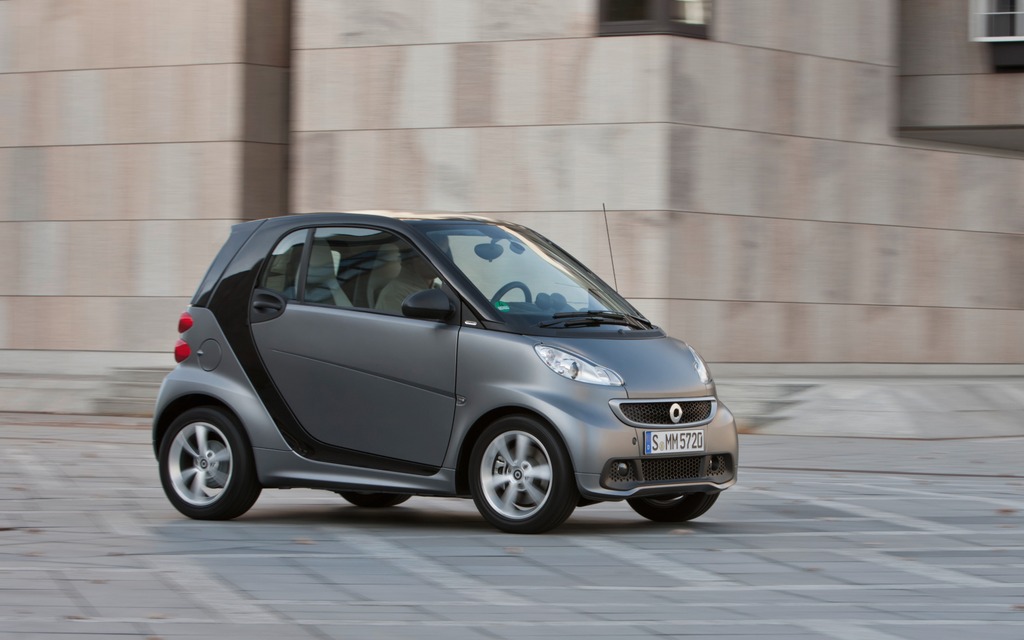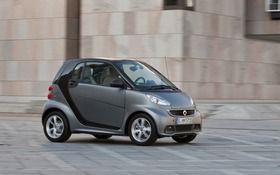2013 smart fortwo: The Ravages of Time

| Strong points |
|
|---|---|
| Weak points |
|
The smart has been with us for seven years already and, boy, have we had good times together. I remember driving this microcar even before it came to North America. Mercedes-Benz Canada, the company that owns smart, had imported a model and lent it to the press as a means of testing the market. What an experience that was!
After that, the smart continued to pique my interest during different test drives – much more than many exotic models. I remember seeing other drivers zig-zag through traffic to try and catch a glimpse of this miniature car, making me feel like something of an attraction, especially when parking. I also found it impossible to leave anywhere without first having to answer a bunch of questions under the blinding flash of cameras. No other cars in its price range garners this kind of attention.
- Also: Smart Forjoy Concept Revealed Ahead of Frankfurt
- Also: The 2015 Smart Fortwo and Forfour are here!
When it came to Canada the following year, the smart captured the heart of a lot of drivers. With its low fuel consumption and diesel engine – not to mention a trendy appeal – it was a real hit. People loved its compact dimensions and its perfectly urban vocation. That said, the main concern the public had was about its safety. It took a while for drivers to feel confident about it. All other flaws were quickly forgiven, including its sensitivity to crosswinds, its short wheelbase, and its decidedly un-dynamic performances and anemic automatic transmission. Any other car with the same shortcomings would have been crucified on the spot. But not the smart. Oh no, the smart was different!
A trek to the Arctic Circle
When smart sales started to dip, its manufacturer decided to organize an expedition to the Arctic Circle. It was a bold move, but the journey allowed the smart to prove its capabilities in the very worst of winter conditions. We were blown away by its handling. Equipped with winter tires, the smart carried us safe and sound, serving up a good dose of fun along the way. It certainly demonstrated that it could withstand Canadian winters without any trouble at all!
Since then, we have grown used to its looks. The smart no longer attracts the attention it once did. Plus, it ditched its diesel engine for a 70-hp 1.0L three-cylinder, a move that didn’t impress purists much. In the end, it’s a classic case of familiarity setting in, and Mercedes-Benz didn’t do much to fan the dwindling flames of passion. Take, for example, the case of the MINI, of which several different versions were released over the years to try and maintain interest, and now Fiat is doing the same with its 500, having released a hatchback version at the Los Angeles Auto Show. But at smart, the efforts were limited to more restrained initiatives, such as offering accessories to customize your car. Brabus accessories have even been made available, but not the turbo engine offered in Europe that genuinely transforms the car into a little fireball.
Naturally, the competition has caught up and the smart is no longer alone in its class. Soaring gas prices have prompted more and more manufacturers to build tiny cars, including the Scion iQ, Fiat 500 and Chevrolet Spark, all of which can carry two additional passengers to boot.
The ravages of time
I recently got behind the wheel of the smart, on which little is new for 2013, other than an updated front grill and new LED headlights. I noted that, with the passing of time, many of this vehicle’s shortcomings are starting to be less tolerable. It happened to be a very windy week and I found myself gripping the steering wheel tightly to keep the car on country roads. I also had to carefully plan my trips, as the smart isn’t the most practical of all vehicles for driving my kids and their gear to hockey practice. It’s hard to imagine having a smart as your main set of wheels if you have a family.
On the highway, the vehicle’s lack of pep is still passably acceptable, but the same cannot be said for its automatic transmission, which lurches every time it changes gears. Actually, this transmission is a manual gearbox whose shifting is automated by electric solenoids. The timing between gear shifts is such that the vehicle loses its thrust and ends up lurching forward and back. You can minimize this effect by changing gears manually and climbing the revs, but not all drivers are so inclined.
Fortunately, the smart still has some things going for it. We still love its low fuel consumption, making it a real pleasure at the pump. And it’s still a cinch to park and a first-class city car.
The electric smart
The only noteworthy change this year is the new electric drive version. This model is equipped with an electric drivetrain featuring a set of lithium-ion batteries and an electric motor that generates 46 horsepower and 96 lbs.-ft. of torque. We’ve been promised 145 kilometers of range when it is fully charged, but obviously this figure can take a hit depending on weather conditions. This version is obviously more efficient and produces almost no emissions. Plus, it does not include the anemic transmission found in the gas version. But, as with all 100% electric vehicles, you have to plan your trips ahead of time. In essence, it’s an interesting addition to the smart line-up, but we doubt that the electric drive will be able to stimulate sales that dramatically.
At the end of the day, it’s not surprising that smart sales are down in Canada. It has aged with time, and Mercedes-Benz has been slow to react. What the smart really needs is a little rejuvenation.











